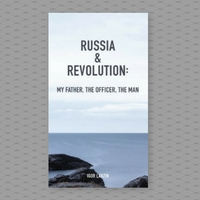WHITE RUSSIANS - RUSSIAN REVOLUTION
In general, White Russians (Russian Revolution) refers to those Russians who were against the Bolshevik socialist uprising of 1917. Many White Russians were imperialists who were loyal to Tsar Nicholas II. The ‘White Army’ force opposed revolution and Civil War erupted.
This is a brief history of the period. Consequently, you can understand more about White Russians and the Russian Revolution, which are the people of and setting for, Igor Labzin’s books.
THE RUSSIAN REVOLUTION EXPLAINED
The Russian Revolution itself was actually two revolutions. They both took place in 1917. The first happened in February. Russia was suffering from the effects of the First World War. There were millions of deaths as well as poverty. Therefore, the time was ripe for revolt. The army garrison joined striking workers in protest in St Petersburg. They wanted socialist reforms. This protest sparked the final abdication of the Tsar. Following this, a temporary government stepped in. (1) During 1917, the Provisional Government continued Russia’s involvement in the First World War. Yet the Bolshevik socialists were against this. The Bolsheviks gathered militia in the months that followed. They launched a second revolt in October. Consequently, the Provisional Government was overthrown. The Bolshevik government led by Vladimir Lenin stepped into its place. The ousting of the temporary government by Bolshevik forces led to a bitter Civil War in Russia. The White Russians in the Russian Revolution led a ‘White Army’ fighting the Bolshevik ‘Red Army.’ Fighting in Russia continued through the rest of the First World War. The defeat of the last White Army Generals in Crimea in 1920 signified the defeat of White Russians in the western part of Russia. Further battles raged in Siberia until 1922 with no gain by the Whites.DEFEAT AND EXILE
Disunity was primarily to blame for the eventual defeat of the White Russians after the Russian Revolution and Civil War. As a result, many White Russians went into exile. They fled Russia for places like Western Europe, and the United States, as well as Shanghai. An article titled Emigration (Russian Empire) from the International Encyclopaedia of World War 1 tells of the difficulties facing Russian emigres. Most noteworthy, there were estimated to be between 1 and 3 million people who were settled outside Russia by 1921:Most Russian subjects who ended up living outside the borders of the empire had been captured as soldiers or had fled and sought refuge from military defeat, hunger, deprivation, or political persecution. It was frequently unclear to international relief organisations and authorities in the country of refuge whom to categorise as a prisoner of war or refugee awaiting repatriation and who was an émigré who would not return. Those who remained abroad often resettled several times in different countries and considered themselves temporary exiles, expecting to go back as soon as the Bolshevik regime collapsed.While most emigres may have been hoping to return to Russia, they did not see the collapse of Soviet rule in their lifetime. Hence Communism continued as the system of government in Russia for another 70 years. REFERENCES (1) http://www.history.com/this-day-in-history/czar-nicholas-ii-abdicates (2) http://alphahistory.com/russianrevolution/russian-civil-war/ (3) http://encyclopedia.1914-1918-online.net/article/emigration_russian_empire
For Most White Russians Russian Revolution Led To Exile
This is One True Account of Life As an Emigre
 From Civil War in Russia, White emigres travelled to new lands in search of a home. Russia and Revolution: My Father, The Officer, The Man is the tale of Boris Labzin. A White Naval Officer who falls into many new adventures, and new dangers, as an emigre.
Buy a hard copy on line
From Civil War in Russia, White emigres travelled to new lands in search of a home. Russia and Revolution: My Father, The Officer, The Man is the tale of Boris Labzin. A White Naval Officer who falls into many new adventures, and new dangers, as an emigre.
Buy a hard copy on line
WHITE RUSSIANS LEAVING SHORES OF RUSSIA 1922
Finally in 1922, the last of the White Russian forces sailed from Russia. Bolshevik forces had gained a final hold in Russia, and it was time to leave. This is now recognised as a sad time in Russia’s history. Most White Russians would never return. The Dom Russkovo Zarubezhya (Foundation of Russians Abroad) put together a short film about this journey. Especially relevant, is the historical footage of the Russian Siberian Flotilla leaving Vladivostok in 1922. The ships were crammed with Officers and families of the White Army in addition to political and civic leaders. In 2012 the Dom invited Author Igor Labzin to mark the 90th Anniversary of the departure of the Flotilla. He features in this excerpt of the Dom’s clip. (Audio is in Russian with English translated text under):English Translation
Firstly, narration of scenes of White Army soldiers marching:“You are seeing a unique picture of these people literally in their last moments in Russia. This is the son of midshipman Boris Labzin, one of those who left the shores of Russia in 1922.”
Interview with Igor Labzin:
“I live in Australia in a city called Brisbane. I am the son of Boris Martemianovich Labzin: a graduate of the Naval Academy in St. Petersburg in 1918. He was part of the White Armed Forces and was involved in the Civil War. In 1922 he, along with many others, evacuated from the Russian Far East. They sailed from there to Manilla in the Philippines. This is a photo of Boris taken in 1924 in Manilla. It was his first civilian suit that he owned and this photo was taken shortly before he left for Shanghai. I have often been asked where I was born and how did I get to Australia etc. and as I started to tell even parts of my story, people would often say “you know Igor you should write it down or it will be lost”. And so I decided to write a book for my daughters about the history of our family starting in St. Petersburg through to Australia.”Finally, narration of scenes of officers on the ships:
“Knowing this part of our history enriches us, even though the events were very sad and tragic.”
